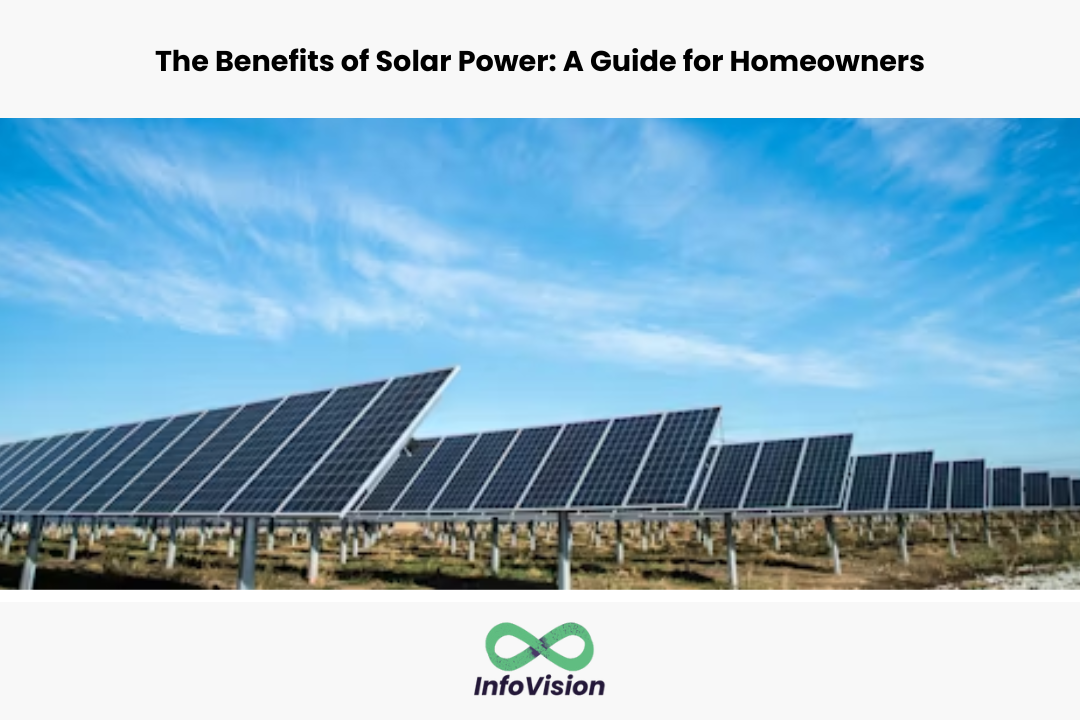The Benefits of Solar Power: A Guide for Homeowners
Solar power has become a popular alternative energy source for homeowners looking to reduce their carbon footprint and save money on their energy bills. The technology has advanced significantly over the years, making it more affordable and accessible to the average homeowner. As a result, many homeowners are now considering solar power as a viable option for their homes.
One of the main benefits of solar power is that it is a renewable energy source. Unlike traditional fossil fuels, solar power does not produce harmful emissions that contribute to global warming and air pollution. Solar power also reduces dependence on foreign oil and other non-renewable energy sources, making it a more sustainable option for the future. Additionally, solar power can help homeowners save money on their energy bills, as they can generate their own electricity and reduce their reliance on the grid.
Understanding Solar Power
Solar Energy Basics
Solar power is the energy that is harnessed from the sun’s rays and converted into usable electricity. It is one of the most abundant and renewable sources of energy available on our planet. The sun produces energy through a process known as nuclear fusion, which releases a tremendous amount of heat and light. This energy travels through space and reaches the Earth’s surface, where it can be captured and converted into electricity.
How Solar Panels Work
Solar panels are the primary technology used to capture solar energy. They are made up of photovoltaic (PV) cells, which are designed to convert sunlight into electricity. When sunlight hits the PV cells, it knocks electrons loose from their atoms, creating a flow of electricity. This electricity can be used to power homes, businesses, and other electrical devices.
Solar panels are typically installed on rooftops or in open areas that receive a lot of sunlight. They are connected to an inverter, which converts the DC electricity produced by the panels into AC electricity that can be used by households and businesses. Excess electricity can be stored in batteries or sold back to the grid.
Overall, solar power has many benefits for homeowners, including reduced energy bills, increased energy independence, and a smaller carbon footprint. As solar technology continues to improve, it is becoming an increasingly popular choice for those looking to reduce their reliance on traditional fossil fuels.
Benefits of Solar Energy
Solar energy provides a multitude of benefits for homeowners. In this section, we will explore three primary benefits: environmental impact, reduction in energy bills, and energy independence.
Environmental Impact
One of the most significant benefits of solar energy is its positive impact on the environment. Solar power is a clean and renewable energy source that does not produce harmful emissions. By using solar energy, homeowners can reduce their carbon footprint and help combat climate change. According to the Department of Energy, a typical residential solar panel system can offset up to 100,000 pounds of carbon dioxide over its lifetime.
Reduction in Energy Bills
Another significant benefit of solar energy is the reduction in energy bills. By generating their electricity, homeowners can significantly reduce their reliance on the grid and lower their monthly utility bills. In some cases, homeowners can even eliminate their energy bills entirely. Solar panels require little maintenance and have a lifespan of up to 25 years, making them a cost-effective investment in the long run.
Energy Independence
Solar energy provides homeowners with energy independence, allowing them to generate their electricity and reduce their reliance on the grid. This independence can be particularly beneficial during power outages or emergencies, ensuring that homeowners have access to electricity when they need it most. Additionally, solar energy can provide a sense of security, knowing that homeowners have control over their energy supply.
Overall, solar energy provides homeowners with a range of benefits, including positive environmental impact, reduction in energy bills, and energy independence. By investing in solar energy, homeowners can make a positive impact on the environment, save money on their energy bills, and gain energy independence.
Evaluating Your Home for Solar
Before installing a solar panel system, it is important to evaluate the suitability of your home for solar. This section will cover the key factors to consider when assessing the feasibility of a solar panel system for your home.
Solar Suitability Assessment
The first step in evaluating your home for solar is to assess its solar suitability. This involves determining the amount of sunlight that your property receives throughout the day. A solar suitability assessment will take into account factors such as the size and orientation of your roof, the presence of shade from trees or buildings, and the local climate.
Roof Condition and Orientation
The condition and orientation of your roof are also important factors to consider when evaluating your home for solar. Ideally, your roof should be in good condition and free from any damage or leaks. In addition, the orientation of your roof can affect the amount of sunlight that your solar panels receive. A south-facing roof is generally considered to be the best orientation for solar panels in the northern hemisphere, while a north-facing roof is best in the southern hemisphere.
Local Climate Considerations
The local climate can also have an impact on the suitability of your home for solar. In areas with high levels of rainfall or snow, it may be necessary to install additional supports or reinforcements to ensure that your solar panels can withstand the weight of the snow or the force of the wind. In addition, areas with high levels of air pollution or dust may require more frequent cleaning of the solar panels to ensure that they are operating at maximum efficiency.
Overall, evaluating your home for solar requires a careful assessment of a range of factors, including solar suitability, roof condition and orientation, and local climate considerations. By taking these factors into account, homeowners can make an informed decision about whether a solar panel system is right for their property.
Solar Power Systems
Solar power systems offer homeowners a sustainable and cost-effective way to generate electricity. There are various types of solar panel systems available in the market, each with its own set of benefits and considerations. Understanding the different types can help homeowners make informed decisions when considering solar energy for their homes.
Types of Solar Panel Systems
- Monocrystalline Solar Panels: These panels are known for their high efficiency and sleek appearance, making them a popular choice for residential installations.
- Polycrystalline Solar Panels: While slightly less efficient than monocrystalline panels, polycrystalline panels are a more budget-friendly option and are suitable for homeowners looking for a cost-effective solar solution.
- Thin-Film Solar Panels: These panels are lightweight and flexible, making them suitable for unique installation scenarios such as curved surfaces or portable applications.
Grid-Tied vs. Off-Grid Systems
Grid-tied systems are connected to the local utility grid, allowing homeowners to draw electricity from the grid when their solar panels are not producing enough energy. On the other hand, off-grid systems operate independently of the grid and require battery storage to store excess energy for use during periods of low solar production.
Battery Storage Solutions
Battery storage solutions, such as lithium-ion batteries, offer homeowners the ability to store excess solar energy for use during peak demand periods or in the event of a power outage. These systems provide increased energy independence and can help homeowners maximize the benefits of their solar power systems.
Financial Incentives
Homeowners who switch to solar energy can enjoy a range of financial incentives that make the transition more affordable. This section will explore three of the most popular financial incentives for solar energy.
Federal and State Tax Credits
The federal solar tax credit, also known as the investment tax credit (ITC), provides homeowners with a 26% tax credit on the cost of their solar panel system installation. Homeowners can claim this tax credit when they file their federal income taxes. The tax credit is set to decrease to 22% in 2023 and will expire in 2024.
In addition to the federal tax credit, many states offer their own tax credits for homeowners who install solar panels. These state-specific tax credits can vary in amount and eligibility requirements. Homeowners should research their state’s tax credit options to see if they qualify.
Solar Renewable Energy Certificates (SRECs)
Solar Renewable Energy Certificates (SRECs) are tradable certificates that represent the environmental benefits of solar energy production. Homeowners who install solar panels can earn SRECs based on the amount of electricity their solar panels produce. These SRECs can then be sold on the open market to utilities and other companies that need to meet renewable energy requirements.
The value of SRECs can vary depending on the market and the state in which the homeowner resides. Some states have mandatory SREC programs that require utilities to purchase a certain amount of SRECs each year. Homeowners should research their state’s SREC program to see if they can benefit from this financial incentive.
Net Metering Benefits
Net metering is a billing system that credits solar panel owners for the excess electricity they generate and feed back into the grid. Homeowners who participate in net metering can reduce their monthly electricity bills and even earn credits that can be used during months when their solar panels do not generate enough electricity.
Net metering policies can vary by state, but most states have some form of net metering program in place. Homeowners should research their state’s net metering policies to see if they can take advantage of this financial incentive.
Overall, these financial incentives can help make the transition to solar energy more affordable and accessible for homeowners. By taking advantage of these incentives, homeowners can save money on their energy bills and contribute to a more sustainable future.
Installation Process
Installing solar panels can be a complex process, but with the right installer, it can be a smooth and efficient experience. Here are some key factors to consider during the installation process.
Choosing a Solar Installer
Choosing the right solar installer is crucial to ensure a successful installation. Homeowners should look for an installer with experience, proper licensing and insurance, and good reviews. It is recommended to get quotes from multiple installers to compare prices and services.
Installation Timeline
The installation timeline can vary depending on factors such as the size of the system and the complexity of the installation. According to CNN Underscored, the installation process typically takes one to three days. However, the entire process from consultation to final inspection can take several weeks to a few months.
Permitting and Regulations
Before installation can begin, homeowners must obtain the necessary permits and comply with local regulations. This can include permits for building, electrical, and fire safety. The installer should handle the permitting process, but homeowners should be aware of the requirements and ensure that all permits are obtained before installation begins.
Overall, the installation process requires careful planning and attention to detail. By choosing a reputable installer and following all regulations, homeowners can enjoy the benefits of solar power for years to come.
Maintenance and Upkeep
Solar panels require minimal maintenance and upkeep, making them a popular choice among homeowners who want to reduce their energy bills and carbon footprint. However, like any other electrical equipment, solar panels require some upkeep to ensure they function efficiently and provide the best return on investment.
Routine Maintenance Requirements
Regular cleaning is essential to maintain the efficiency of solar panels. Dust, dirt, and other debris can accumulate on the surface of the panels, reducing their ability to absorb sunlight. Homeowners can clean their solar panels themselves or hire a professional to do it for them. It is important to avoid using abrasive materials or harsh chemicals that can damage the surface of the panels.
In addition to cleaning, homeowners should also check their solar panels periodically for signs of damage or wear and tear. This includes inspecting the mounting hardware, wiring, and other components for signs of corrosion or damage. Any issues should be addressed promptly to prevent further damage to the system.
Monitoring System Performance
An important part of solar panel maintenance is monitoring the performance of the system. Homeowners should keep track of the amount of energy their solar panels are producing and compare it to their energy usage. This can help identify any issues with the system, such as a drop in efficiency due to a faulty component or shading from nearby trees or buildings.
Many modern solar systems come with monitoring software that allows homeowners to track the performance of their panels remotely. This can be a useful tool for identifying issues and optimizing the performance of the system.
Dealing with Repairs and Issues
Despite their durability and low maintenance requirements, solar panels can still experience issues that require repairs or replacement. Homeowners should be aware of the warranty on their solar panels and what is covered under it. In many cases, solar panel manufacturers offer warranties of up to 25 years, covering defects in materials and workmanship.
If a homeowner experiences an issue with their solar panels, they should contact the manufacturer or installer for assistance. In some cases, repairs may be covered under the warranty, while in other cases, the homeowner may need to pay for repairs out of pocket. It is important to address any issues promptly to prevent further damage to the system and ensure it continues to function efficiently.
Overall, solar panels are a low-maintenance and durable energy solution for homeowners. With proper maintenance and monitoring, they can provide reliable and efficient energy for many years, helping homeowners save money and reduce their carbon footprint.
Return on Investment
Solar power is an investment that can provide significant returns over time. Homeowners who invest in solar panels can expect to see a return on investment (ROI) in the form of reduced energy bills and increased home value.
Calculating Payback Period
The payback period is the amount of time it takes for the savings from solar panels to equal the initial cost of the system. According to Forbes, the average ROI of solar panels in the US is about 10%. This means that homeowners can expect to make an average profit of $10 for every $100 spent on a solar power system. The payback period for solar panels can vary depending on several factors, including the cost of electricity in the area, the size of the system, and the amount of sunlight the panels receive.
To calculate the payback period for a solar power system, homeowners can divide the cost of the system by the annual savings. For example, if a solar power system costs $20,000 and saves the homeowner $2,000 per year on electricity, the payback period would be 10 years.
Resale Value of Solar Homes
In addition to saving money on energy bills, solar panels can also increase the resale value of a home. According to a study by the National Renewable Energy Laboratory, homes with solar panels sold for an average of $17,000 more than homes without solar panels. This increase in value can vary depending on the location, size, and age of the system.
When selling a home with solar panels, homeowners should be sure to highlight the benefits of the system to potential buyers. This can include information on the energy savings, the environmental benefits, and the increased home value. By doing so, homeowners can maximize the ROI of their solar power investment.
Overall, solar power is a smart investment for homeowners looking to save money on energy bills and increase the value of their home. By calculating the payback period and highlighting the benefits of the system, homeowners can make an informed decision about whether solar power is the right choice for them.
Advancements in Solar Technology
As the demand for renewable energy sources continues to grow, so does the need for more efficient and cost-effective solar technology. In recent years, there have been significant advancements in solar panel technology, leading to increased efficiency, longer lifetimes, and lower costs. This section will explore some of the most significant innovations in solar technology.
Innovations in Solar Panel Efficiency
One of the most significant advancements in solar panel technology has been the increase in efficiency. Solar panels are now capable of converting a higher percentage of sunlight into electricity than ever before. This increase in efficiency has led to a reduction in the number of panels required to generate the same amount of electricity, making solar power more cost-effective.
New materials such as perovskite have been developed to improve the efficiency of solar panels. Perovskite is a crystalline material that can be used to create solar cells that are more efficient than traditional silicon solar cells. Perovskite solar cells can be made using inexpensive materials and can be printed onto flexible substrates, making them ideal for use in a wide range of applications.
Emerging Solar Technologies
In addition to improvements in solar panel efficiency, there are also several emerging solar technologies that show great promise for the future. One such technology is concentrated solar power (CSP). CSP uses mirrors or lenses to concentrate sunlight onto a small area, which heats a fluid to create steam. The steam is then used to generate electricity in a conventional steam turbine.
Another emerging solar technology is solar windows. These windows are made of transparent solar cells that can generate electricity while still allowing light to pass through. Solar windows have the potential to revolutionize the way we think about solar power, as they can be installed in buildings without the need for large solar panels.
Overall, the advancements in solar technology have made solar power more efficient, cost-effective, and accessible than ever before. As the demand for renewable energy continues to grow, it is likely that we will see even more innovations in solar technology in the years to come.
Solar Power and the Community
Solar power not only benefits individual homeowners, but it can also have a positive impact on the community as a whole. Here are some ways solar power can benefit the community:
Community Solar Projects
Community solar projects are designed to provide solar power to multiple households or businesses in a community. These projects are typically funded by a group of investors or a utility company. Homeowners can subscribe to the project and receive a portion of the energy generated by the solar panels. This allows homeowners who may not have the ability to install solar panels on their own homes to still benefit from solar power.
Impact on the Local Economy
Solar power can have a positive impact on the local economy. The installation of solar panels creates jobs in the community, ranging from sales and marketing to installation and maintenance. Additionally, solar power can help reduce the demand for electricity from the grid, which can lead to lower energy costs for homeowners and businesses. This can free up money that can be spent on other goods and services in the community, which can further stimulate the local economy.
In conclusion, solar power not only benefits individual homeowners but can also have a positive impact on the community as a whole. Community solar projects and the installation of solar panels can create jobs and reduce energy costs, which can help stimulate the local economy.
Frequently Asked Questions
How can homeowners benefit financially from installing solar panels?
Homeowners can benefit financially from installing solar panels in several ways. Firstly, they can significantly reduce their monthly electricity bills by generating their own electricity. Secondly, solar panels can increase the value of a home, making it more attractive to potential buyers. Finally, homeowners can take advantage of government incentives and tax credits to offset the cost of installation.
What government incentives are available for residential solar panel installation?
There are several government incentives available for residential solar panel installation, including the federal solar tax credit, which allows homeowners to claim a credit of up to 26% of the cost of installation. Some states also offer additional incentives, such as rebates and performance-based incentives. Homeowners should consult with a tax professional to determine which incentives they qualify for.
What are the long-term advantages of switching to solar energy for a household?
Switching to solar energy can provide several long-term advantages for a household. Firstly, it can significantly reduce or eliminate monthly electricity bills, providing substantial savings over time. Secondly, solar panels have a long lifespan and require minimal maintenance, making them a reliable and cost-effective source of energy. Finally, solar energy is a clean and renewable source of energy, reducing a household’s carbon footprint and contributing to a more sustainable future.
How does solar power installation impact the value of a home?
Solar power installation can significantly impact the value of a home, making it more attractive to potential buyers. According to a study by the Lawrence Berkeley National Laboratory, homes with solar panels installed sell for an average of $15,000 more than homes without solar panels. Additionally, solar panels can increase a home’s energy efficiency, making it more desirable to environmentally conscious buyers.
What are the key considerations when choosing solar panels for residential use?
When choosing solar panels for residential use, homeowners should consider several factors, including the efficiency of the panels, the warranty offered by the manufacturer, and the cost of installation. Additionally, homeowners should consider the size of their roof and the amount of sunlight it receives, as this can impact the amount of energy that can be generated.
Can DIY solar panel installations be effective for homeowners?
While DIY solar panel installations can be effective for homeowners, they are not recommended for most people. Solar panel installation requires specialized knowledge and equipment, and mistakes can be costly or even dangerous. Additionally, DIY installations may not be eligible for government incentives or warranties offered by manufacturers. Homeowners should consider hiring a professional solar panel installer to ensure a safe and effective installation.





